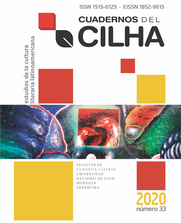Know or lie: the affective conformation of power according to The faculties
Keywords:
Affect, Power, Anxiety, Uncertainty, Eloísa SolaasAbstract
Affect theory as deployed by the Affective Turn usually repeats a set of key characteristics to define affects: understood as the capacity to affect and be affected, affects are performative and question a series of important oppositions – reason/emotion; body/mind; interior/exterior-. Indeed, these are some of the features that have been analyzed in the last two decades based on premises discussed essentially by Spinoza, but also by cultural studies, contemporary philosophy, anthropology and LGTBIQX theories. In this article I scrutinize one of the dimensions exhibited in the foundational moments of this tradition: the role of affects in the constitution of power, but also in the possibilities of challenging it. In order to unfold my perspective on this matter I will not focus on images or texts explicitly political, but on a recent Argentinean documentary film: Las facultades, directed by Eloísa Solaas, where, according to my analysis, the affective rules involved in the constitution of power as well as in possible ways of confronting it, are examined under a sophisticated perspective.
References
Ahmed, S. (2004). The Cultural Politics of Emotion. Routledge.
Aryal, Y. (otoño, 2012). Powers of Resistance: Ideology and Affect. A Interview with Brian Massumi. The Journal of Philosophy: A Cross-Disciplinary Inquiry, 7 (18). https://www.springerin.at/en/2013/2/krafte-des-widerstands-ideologie-und-affekt/
Baudrillard, J. (1987). Cultura y simulacro. Kairós, 1987.
Robin, G. (1996). Idea de la Historia. Fondo de Cultura Económica.
Czirak et.al (2019). P(reenactment). En SLaby, Jan et al (eds.), Affective Societies, Routledge.
Dinshaw, C. (1999). Getting Medieval. Sexualities and Communities. Pre- and Postmod-ern. Duke University Press.
Flatley, J. (2008). Affective Mapping, Harvard University Press.
Hemmings, C. (2018). Considering Emma Goldman. Feminist political ambivalence and the imaginative archive. Duke University Press.
Jesi, F. (2014). Spartakus. Simbología de la revuelta. Adriana Hidalgo.
Luciano, D. (2007). Arranging Grief: Sacred Time and the Body in Nineteenth-Century America. NYU Press.
Massumi, B. (2002). Parables for the Virtual. Duke University Press.
Massumi, B. (2015). Ontopower. War, Powers and the State of Perception. Duke University Press.
Massumi, B. (2017). The Principles of Unrest. Open Humanities Press.
Ngai, S. (2005). Ugly Feelings. Harvard University Press.
Reidl, Friedlind (2019). Atmosphere. En Slaby, J. et al., Affective Societies. Routledge.
Schneider, R. (2011). Performing Remains: Art and War in Times of Theatrical Reenactment. Taylor and Francis.
Slaby, J. (2019). Affective Arrangements. En Slaby, J. et al., Affective Societies. Routledge.
Stewart, K. (2007). Ordinary Affects. Duke University Press.
Stoler, A. (2008). Along the archival grain. Epistemic anxieties and colonial common sense. Princeton University Press.
Stoler, A. (2010). Archivos coloniales y el arte de gobernar (J. Sierra, Trad.). Revista Colombiana de Antropología, 46 (2), 465-496.
Thompson, M. and Biddle, I. (eds.). (2012). Sound, Music, Affect: Theorizing Sonic Experience. Bloomsbury Academic.
Wetherell, M. (2012). Affect and Emotion. A New Social Science Understanding. SAGE.





















